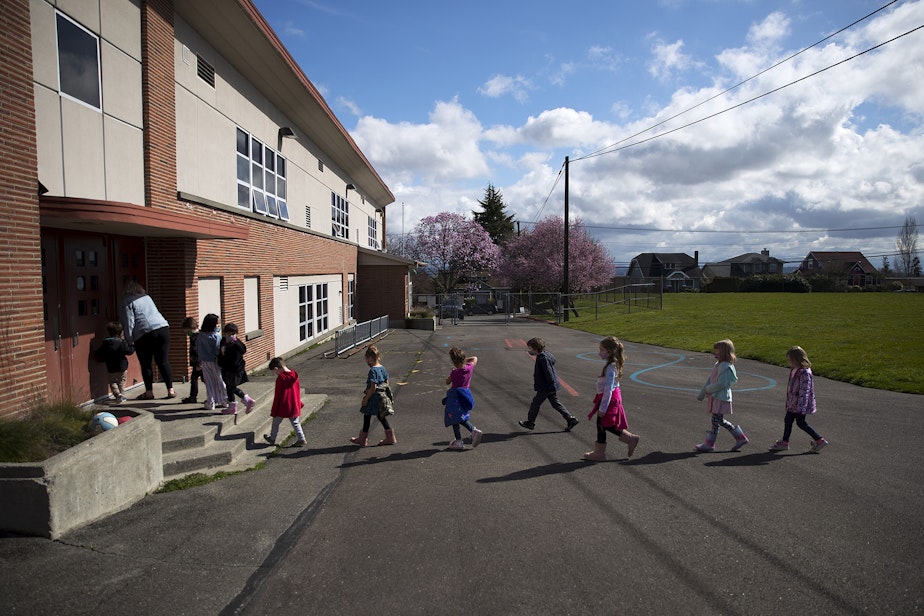Masks work. But do mask mandates work in schools? That’s debatable

Starting Monday, it’ll be up to individual districts and private schools to decide about masks.
Masks help prevent the spread of Covid. That’s basic science. But what about mask mandates in schools, where students may wear them badly, or take them off to hang out after school — does that make a difference in terms of spread?
Turns out … maybe not.
This may be reassuring news to parents and teachers as the Washington state mask mandate lifts on March 12. School districts and private and religious schools will decide for themselves whether to require masks.
A study comparing two neighboring school districts in Tennessee — where one required masks, the other allowed students to opt out of masking (and 25 percent of students did) — found that masks didn’t appear to have a big effect on Covid rates.
Margery Smelkinson is an infectious disease researcher who looked at this study and a similar analysis in North Dakota.
Sponsored
“The mask-optional district, for quite a period of time, actually looked to be doing better in terms of case rates,” Smelkinson said. “Studies like this show that we can take our masks off and it’s going to be fine. I think seeing the data really is eye-opening for a lot of people.”
There are other studies, too, comparing school districts with and without mask mandates. But there are almost always other differences between those districts — like the staff or student vaccination rates, how much kids are socializing after school or in community settings, whether or not masks are worn in non-school sites, like grocery stores and hair salons. That’s what makes the Tennessee study interesting — the two districts had similar vaccination rates and community attitudes.
Not everyone is saying off with their masks, however. Many epidemiologists and public health officials say the potential benefits of masks make the mandates worth it.
Good masks worn correctly cut down on transmission, so it seems likely that asking students to mask will have some effect on transmission and can especially help protect immunocompromised kids who can’t get vaccinated.
Dr. Helen Chu, an epidemiologist at the University of Washington, believes mask mandates help cut down on transmission in schools.
Sponsored
“We know that children shed virus,” Chu said. “We know that masks work to prevent you from transmitting the amount of virus that you have to others and from acquiring it. So it makes sense that masking a child will help to prevent transmission.”
If you can get your kid to wear a high-quality mask correctly and consistently, they are definitely less likely to get Covid, and, if they do get Covid, they’re less likely to spread it to others.
Still, the U.S. is an outlier on masks in schools. The World Health Organization doesn’t recommend masks for kids under 5, and the European health commission doesn’t recommend masks for kids under 12.
One reason these health organizations try to keep kids free of masks is that masks in schools have costs that, say, masks at grocery stores don’t.
Small children, for example, rely on facial expressions to learn empathy and understand how people are feeling. English language learners rely heavily on lip reading to understand what’s being said. Masks also make it harder for all children to hear and understand their peers, which makes connection tougher.
Sponsored
Smelkinson, the infectious disease researcher, said these costs outweigh the proven benefits of mask mandates in schools.
“The real-world evidence does not indicate that the masks are really that effective in schools, at least the masks that the kids are currently wearing,” she said. “We’re two years in. We have really good data about what we know works. Obviously, encouraging vaccination, making sure you have proper ventilation, utilizing outdoor spaces.”
Come Monday, masks in some districts — like Bellevue, Everett, and Lake Washington — will be optional. Other districts — including Seattle — are holding onto mask mandates for now.
Seattle Public Schools will continue requiring kids to wear masks indoors and outdoors, including at outdoor recess. Wherever they stand on indoor masks, all the experts interviewed for this story agreed that kids shouldn’t have to wear masks outside — there’s no evidence that Covid transmits outdoors.




